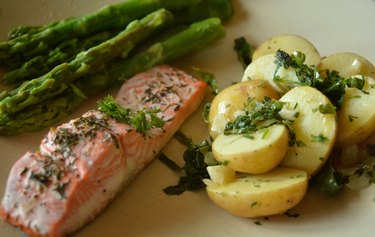
The three macronutrients -- carbohydrates, fats and proteins -- contain calories, which deliver the energy you need to keep active and stay healthy. Even though your body can use all three for energy, protein is at the bottom of the list. The goal of a balanced, protein-sparing diet is to provide enough carbs and fats to avoid converting protein into energy.
Protein-Sparing Effect
Video of the Day
The protein-sparing effect is all about making sure that the proteins you consume are not used as a source of energy. As you spare protein from being used for energy, you help ensure that your body has all it needs to fill protein's other life-supporting roles, from building and repairing tissues and muscles to making antibodies and enzymes. It's important to eat the protein you need every day -- and prevent it from being used for energy -- because your body doesn't store it like carbs and fats, reports MedlinePlus.
Video of the Day
Get Your Daily Carbs
Your body loves to use the sugars in carbs to spare proteins from being used for energy. The recommended dietary allowance for carbs -- 130 grams daily -- is based on their role as the primary source of energy for your brain. You can also determine your carb requirements by calculating 45 percent to 65 percent of your total daily calories, according to the Institute of Medicine. For long-lasting energy, pack your diet with fiber-rich complex carbs such as whole grains, potatoes, corn, beans and peas.
Fill In With Healthy Fats
Fats deliver 9 calories per gram of fat, compared to 4 calories in each gram of carbohydrates and proteins. You need dietary fats, not just for energy, but also because they help build cells, make hormones and digest fat-soluble nutrients. The Institute of Medicine recommends getting 20 percent to 35 percent of your daily calories from fats. The best way to fill your daily requirement is with unsaturated fats because they help lower cholesterol. You'll get these healthy fats from fish such as salmon, tuna and trout, canola oil, flaxseeds, walnuts and other nuts.
Optimize Protein Intake
As you create a diet that balances macronutrients, plan on filling 10 to 35 percent of your daily calories with protein. If your protein does not exceed 35 percent of your calories, then the rest of your diet should supply enough carbs and fats to support the protein-sparing effect. Lean meat, poultry, fish and soybeans have 20 to 25 grams of protein in a 3-ounce serving. Beans are the next best source, with each cup supplying about 15 grams of protein. One cup of cooked quinoa has 8 grams of protein, while you'll get roughly 6 grams from 1 cup of cooked oatmeal, low-fat milk or yogurt and 1 ounce of cheese.
- Institute of Medicine: Dietary Reference Intakes for Energy, Carbohydrate, Fiber, Fat, Fatty Acids, Cholesterol, Protein, and Amino Acids (Macronutrients)
- Extension: Protein Sparing Action
- Iowa State University: Role of Carbohydrates
- Institute of Medicine: Dietary Reference Intakes: Macronutrients
- Linus Pauling Institute: Essential Fatty Acids
- National Institute of General Medical Sciences: Proteins Are the Body’s Worker Molecules
- University of Illinois at Urbana-Champaign, McKinley Health Center: Macronutrients -- The Importance of Carbohydrate, Protein, and Fat
- MedlinePlus: Dietary Protein